1/4-Life Crisis: 18-Footer Across the Atlantic
A sailor crosses the Atlantic both directions in a Hurley 18 trailersailer
Nicolas Manthos can hardly be called risk averse. He was already a professional paraglider when, after only a couple of years sailing, the 26-year-old set off to cross the Atlantic aboard an 18-foot boat he named 1/4 Life Crisis.
Not only did Manthos cross the Atlantic successfully, he found the lonely lifestyle of the 30-day voyage so agreeable he decided to sail the Hurley 18 trailersailer back across the North Atlantic.
We caught up with the intrepid voyager and asked him about his seamanship tactics, whether he was ever scared, and the difference between saying things and actually doing things.
What sailing had you done previous to your Atlantic Crossing that gave you confidence you could do it successfully in an 18-foot boat?
The Hurley 18 was my first boat and I learned to sail on it. I brought it to Greece on a trailer after doing a refit back home in Austria. Me and a friend spent six weeks cruising around the Ionian Islands and learning how to sail before I left singlehanded to Italy.
After crossing the Mediterranean I decided the boat an I were ready to cross the Atlantic.
Why did you choose the Hurley 18?
From reading and watching videos about small-craft voyages I knew the Hurleys were great boats! First I was looking for a 22-footer, but then I found an 18 very close to my home and I just fell in love with it.
In retrospect, how happy were you with your choice of boat?
Very much! I really enjoyed the ease of the tiny boat. Although I think I would suggest something a little bigger, as the price doesn't go up much until 26 feet and you get much more living space.
Out on the ocean words don’t count for anything—it’s you, the boat, and the ocean. If you prepared well and are up to it you’ll have a great time. If not you will be in trouble…
In what ways did your boat’s smaller size work against you? Were there ways in which you think your boat was more vulnerable? Any advantages to the smaller size in terms of seaworthiness?
Well, I think the only point which makes a small boat not ideal is the fact that you can’t climb the mast at sea—which can lead to some big problems if you do not prepare very well!
Other than that it's all about comfort…. and of course performance.
How do you rate the boat’s performance? What was your best day at sea in terms of distance covered?
As long as you’re going downwind or reaching it's not that bad at all. On the tradewinds I was doing consistent 100nm days. My best day was on the last leg from the Azores to France. I knew the boat very well by then and pushed it hard to get 125nm in 24 hours.
In the Med without a real engine I was sometimes doing less than 30nm … My average through the med was about 45nm a day.
Were there any other boats you originally considered?
Not really. I Liked the Vega 26 and Nicholson 26 but they were too big for me to trailer.
In what ways did you upgrade or outfit the boat the voyage?
I didn't change too much. I think solid sails with big reefs and a reliable windvane are a must. A liferaft and EPIRB should be on every boat doing a crossing, and I had a Garmin Inreach as a backup satellite tracker and for communication.
I also carried a Series Drogue but I never deployed it.
How important was your windvane steering system?
The most important thing on the boat! I used it 99.99% of the time!
What was your sail inventory and what was your most common sail setup?
Main, jib, storm jib, spinnaker, spare jib. On the tradewinds I was wing-on-wing with the jib rolled up more or less and the storm jib.
I didn't use the Spinnaker a lot, but it was very nice to have !
Did you have to make any significant repairs during the voyage?
Not really. My forestay broke—that was my only breakdown. I prepared a Dyneema spare at the mast top ready to go before I left Gibraltar, as I couldn't climb the mast. This came in very handy as I could hoist my spare jib on it!
What other gear proved indispensable on the voyage?
Good sails with big reefs, reliable windvane, liferaft, EPIRB, backup satellite tracker (Garmin Inreach)
Tell us about your scariest or most challenging moment or period?
There wasn't really anything super scary—maybe one day on the North Atlantic. We were going upwind in about 30 knots and I was worried about the boat a lot. I think it was mostly my mind—the boat was fine!
What did you consider the biggest risks or dangers?
Containers and a very big storm in the North Atlantic.
Any seamanship tips or techniques you used, or thing to share with other small-boat sailors who might get caught offshore in rough weather?
I think every boat handles a bit differently so it's hard to say… If you have sea room, I would always run from the storm and at some point deploy the drogue. Make sure your windvane is safe when you deploy the drogue as the bridles can damage it easily.
Talk to us about the emotional challenges of such a long period at sea alone. Were you ever lonely or depressed? What strategies did you use to counter any feelings of despair?
I took on this voyage to find out if I liked to be alone at sea. Turns out I do! So it was kind of easy. For sure sometimes you have a bad day and you miss your girlfriend and friends, but I have bad days on land as well.
What were some of the best or most enjoyable moments of the voyage?
All of it! All the sunsets, the great sailing, being alone and experiencing yourself in a very raw way. I loved it!
As much as I liked the voyage, the landfall, the people you meet and the parties are just as good.
Do you think most sailors underestimate the capabilities of smaller boats?
Yes! I think if you can cope with the discomfort you can do almost everything on a well-prepared small boat.
What would you tell someone considering a similar small-boat voyage?
I think what's most important is to understand that you will be alone out there, so you better be prepared! Think about every scenario.
Small boat voyages are often seen as reckless but if you prepare well we can prove that small boats are safe.
In the end any boat can sink.
In what ways was your paragliding experience useful and how would you compare the risks to sailing?
For sure! I learned a lot about weather, so that was a big benefit. Also, a big point is risk management and coping with difficult situations. This is something you learn over the years of doing “extreme” sports.
Herman Melville wrote “A man thinks that by mouthing hard words he understands hard things.” It’s obvious we learn the most through action and experience. What do you think people miss out on when they don’t do hard things?
I think that’s a big part of why I love sailing so much. Out on the ocean words don’t count for anything—it’s you, the boat, and the ocean. If you prepared well and are up to it you’ll have a great time. If not you will be in trouble…
Nobody has to experience this, but the ones who seek the adventure will be rewarded.
Tell us about Sailing One World and your current projects?
I took a bit of a turn and after sailing this very slow 18-footer—I needed a change. I set my mind on sailing singlehanded nonstop around the world in the RWYC Worldstar Regatta. For this race I bought an old Class 40.
All of this adventuring started about 10 years ago when I had an accident. I survived due to the amazing medical care we have these days, but it left me blind in one eye. Now I want to give something back! While preparing and doing my circumnavigation I want to fundraise for two organizations that bring medical care to people who can't afford it. You can follow SailingOneWorld on all social media Channels or on my website
Any new projects or adventures planned?
I try to take one step at a time but there will be something coming up for sure!
•SCA•
You can see Nico’s wonderful video series of his voyage on Youtube here. —Eds



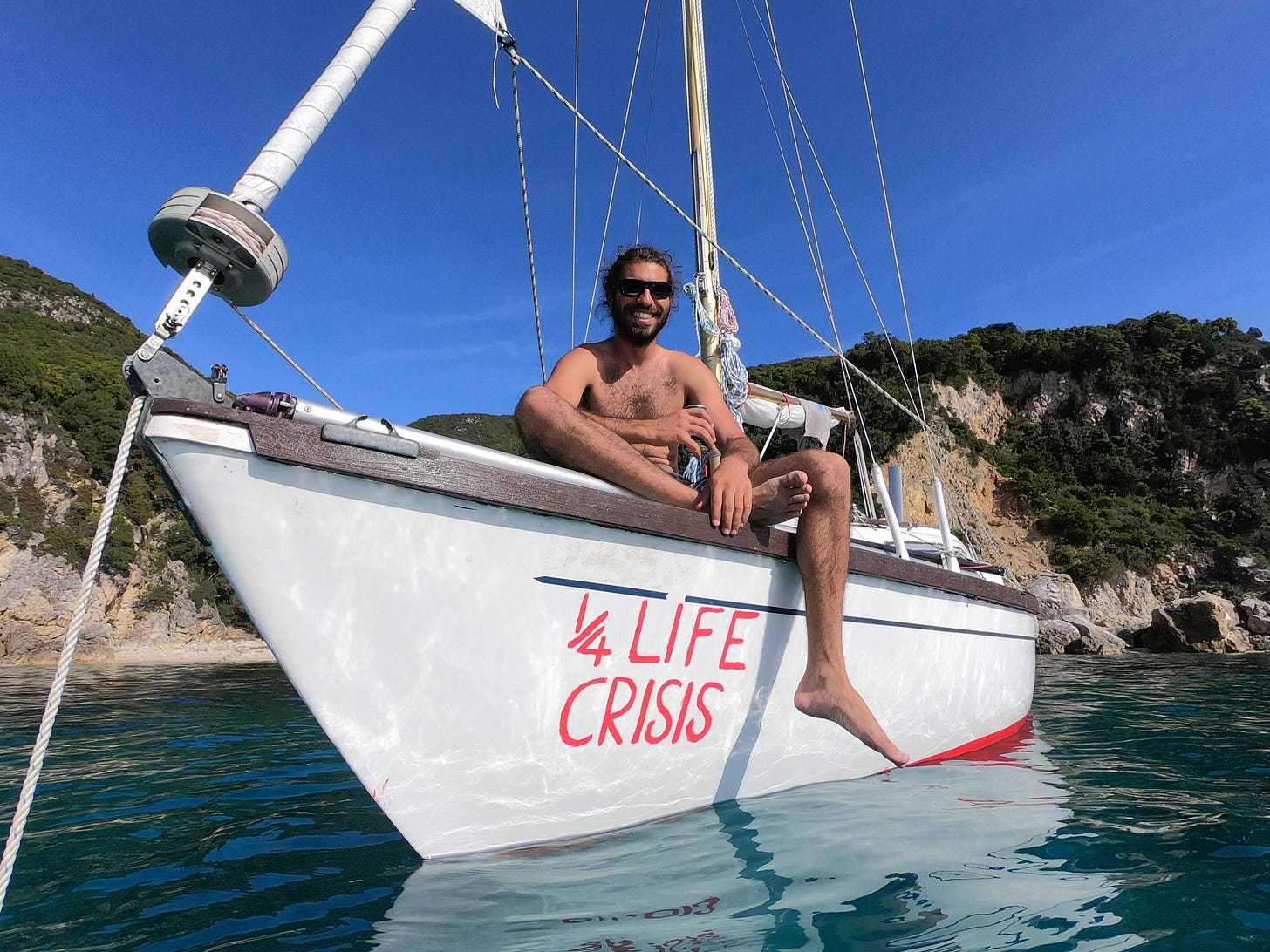
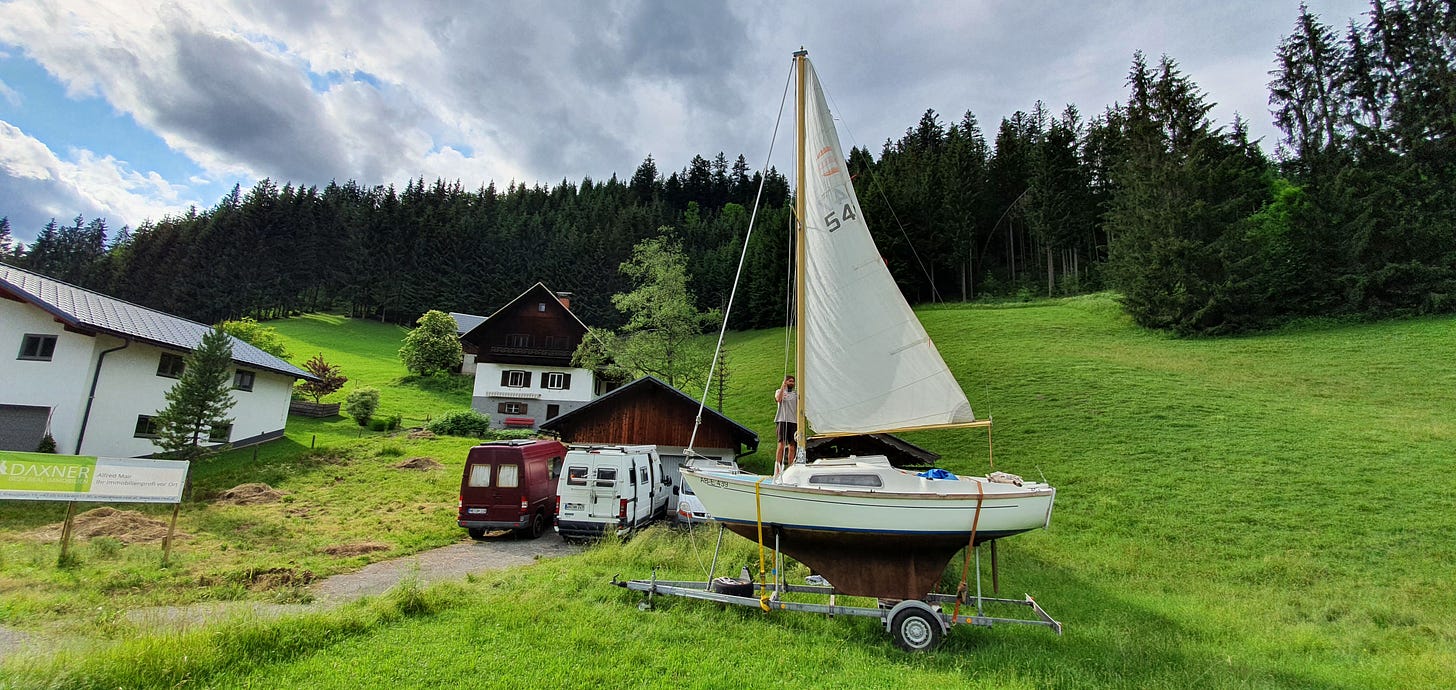

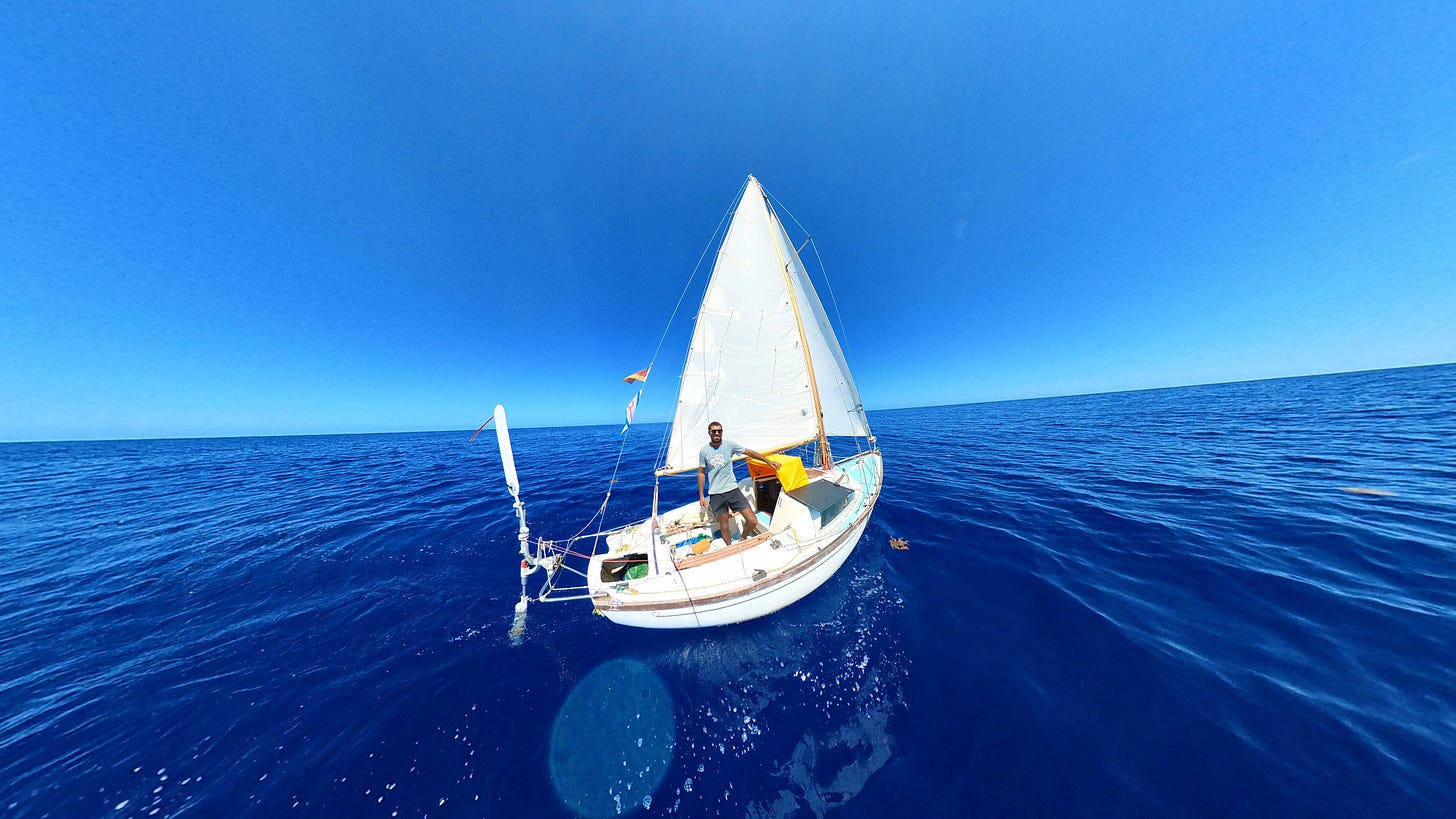
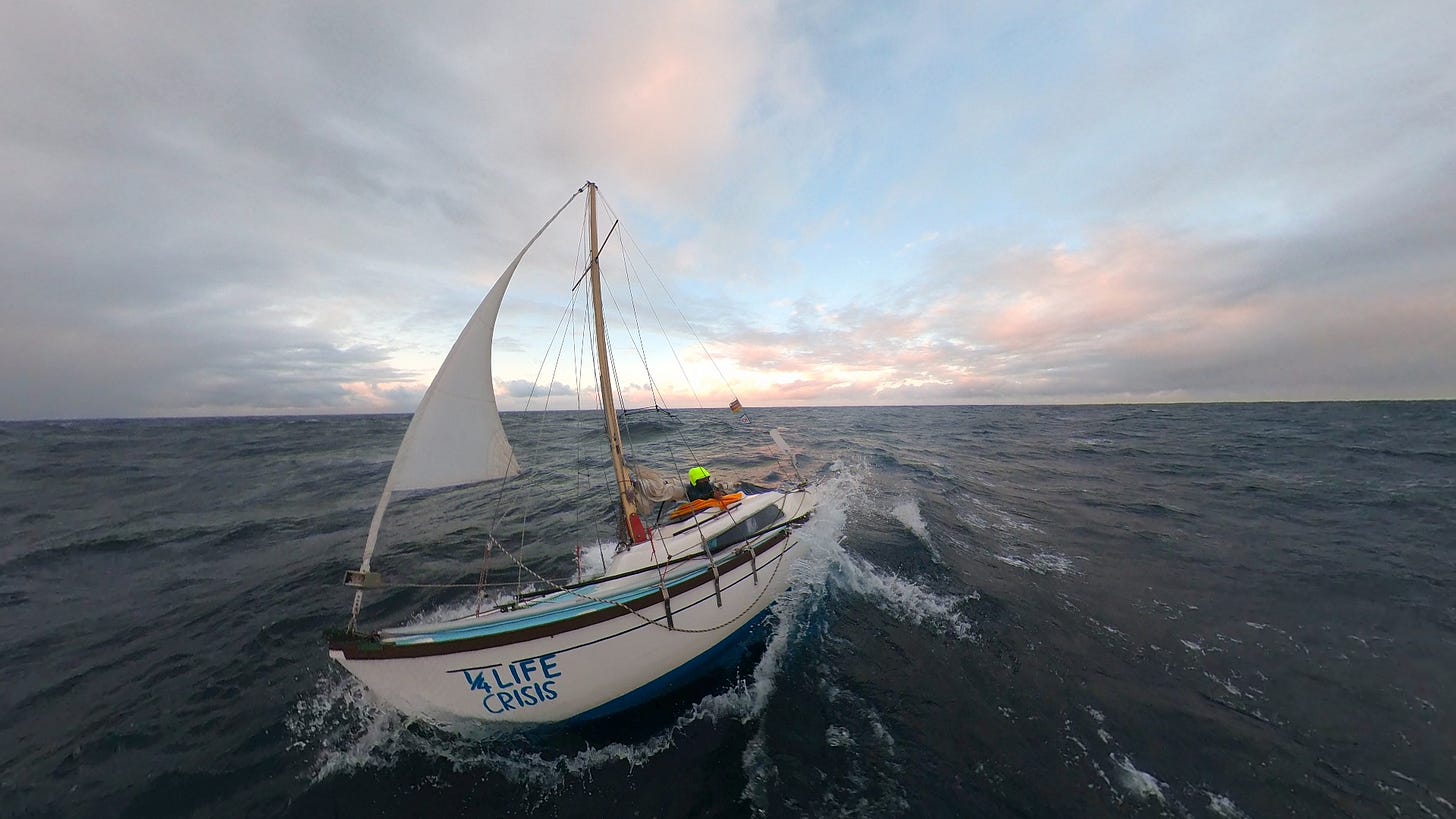
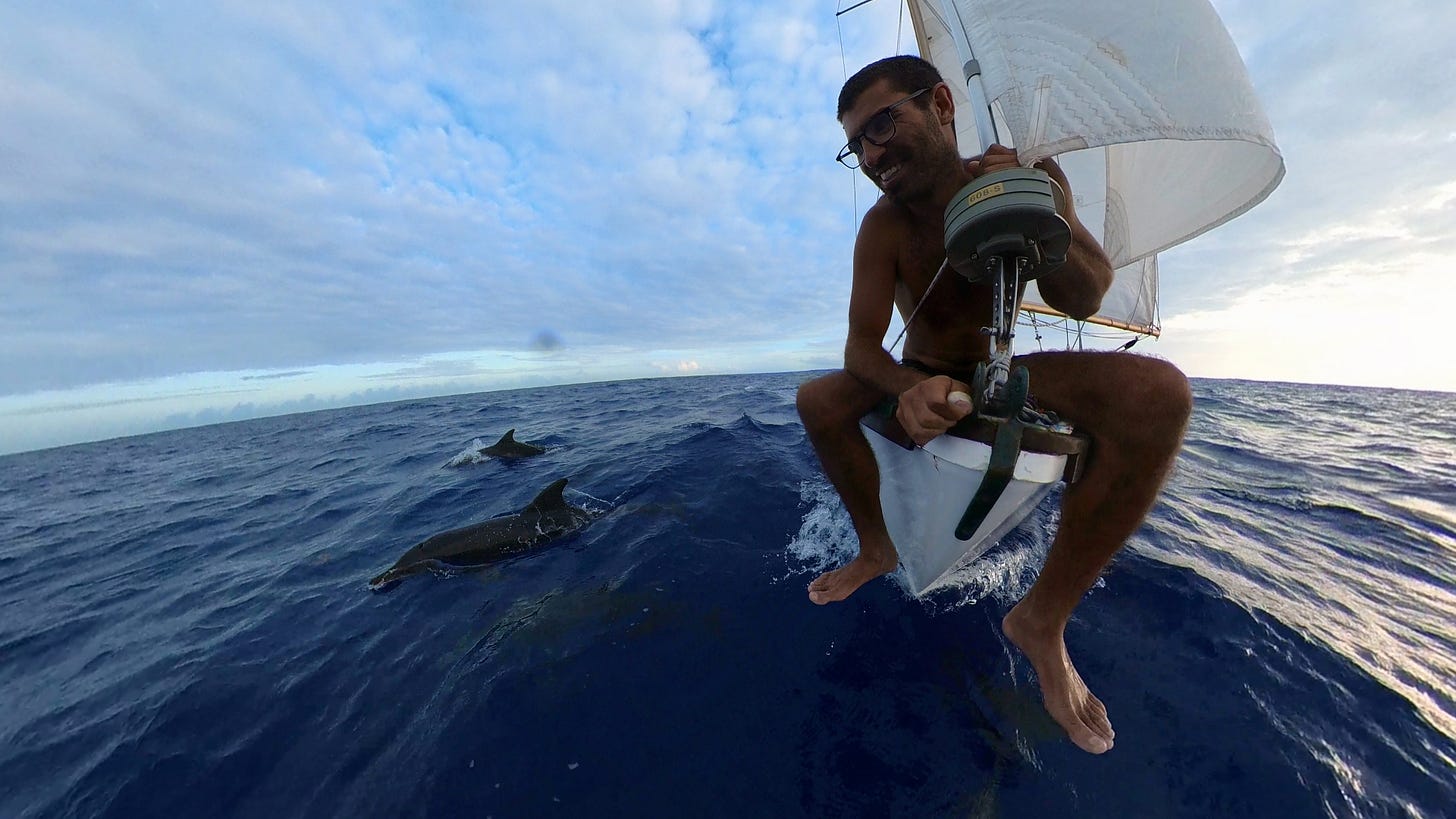
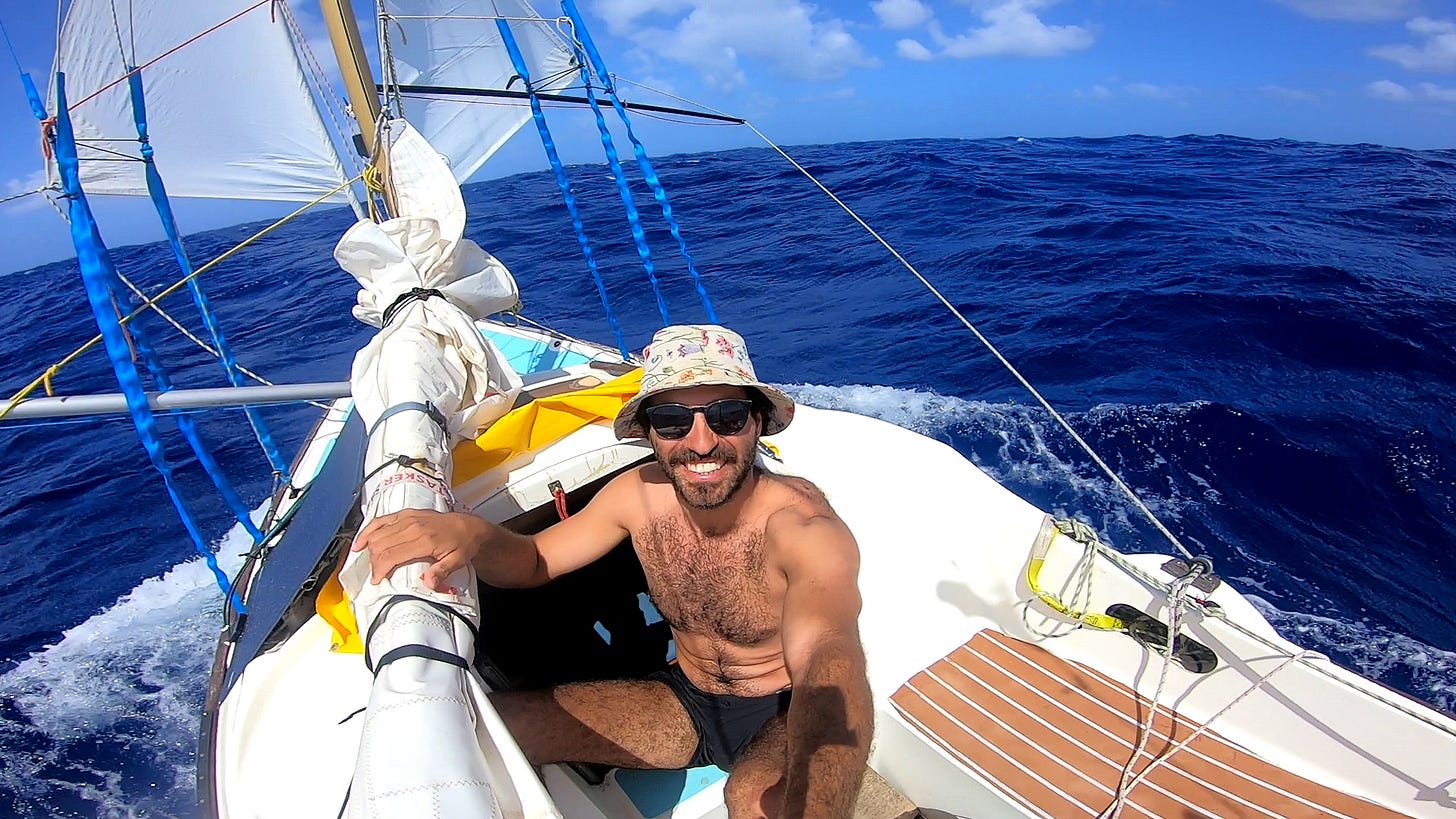
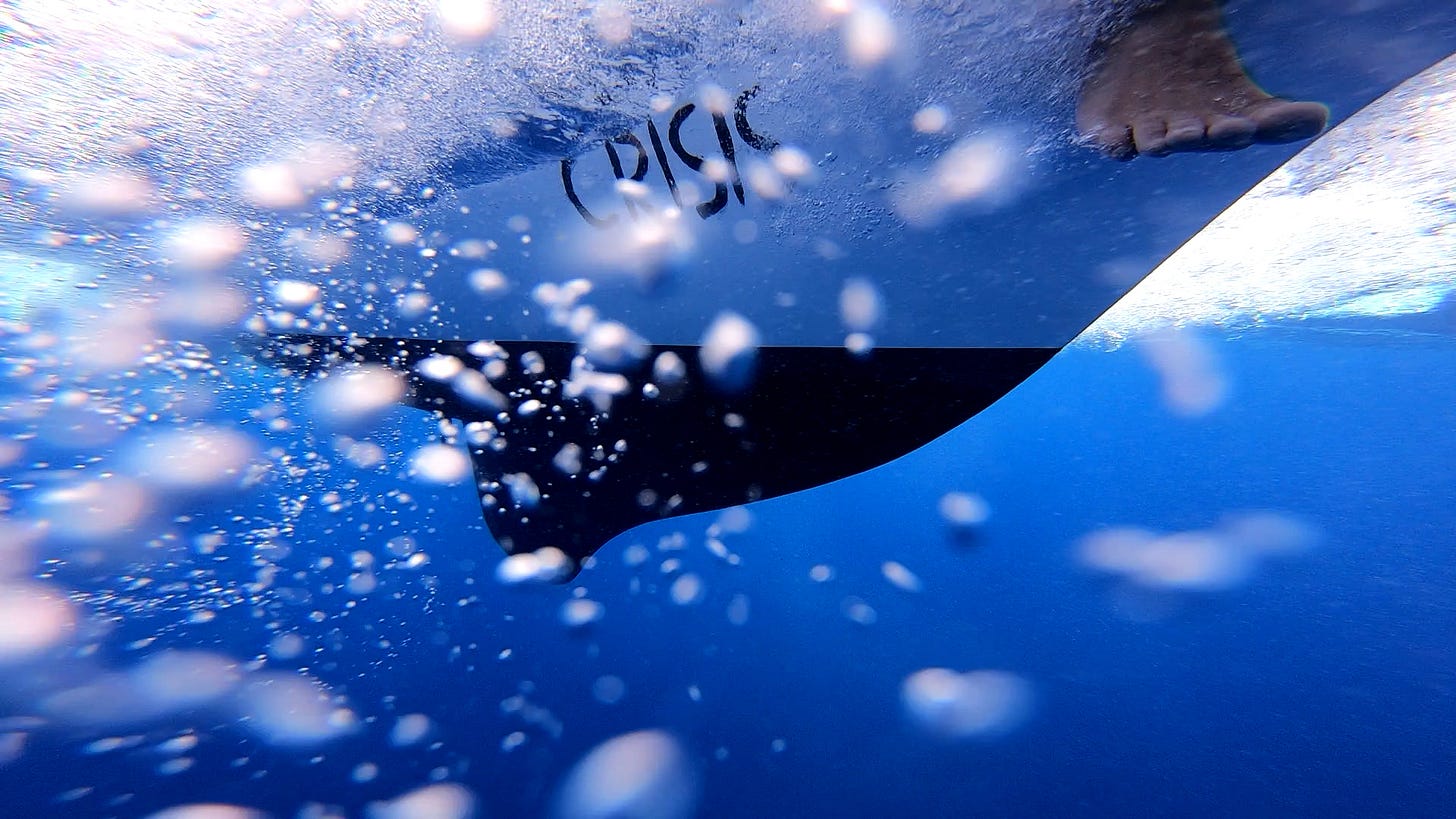
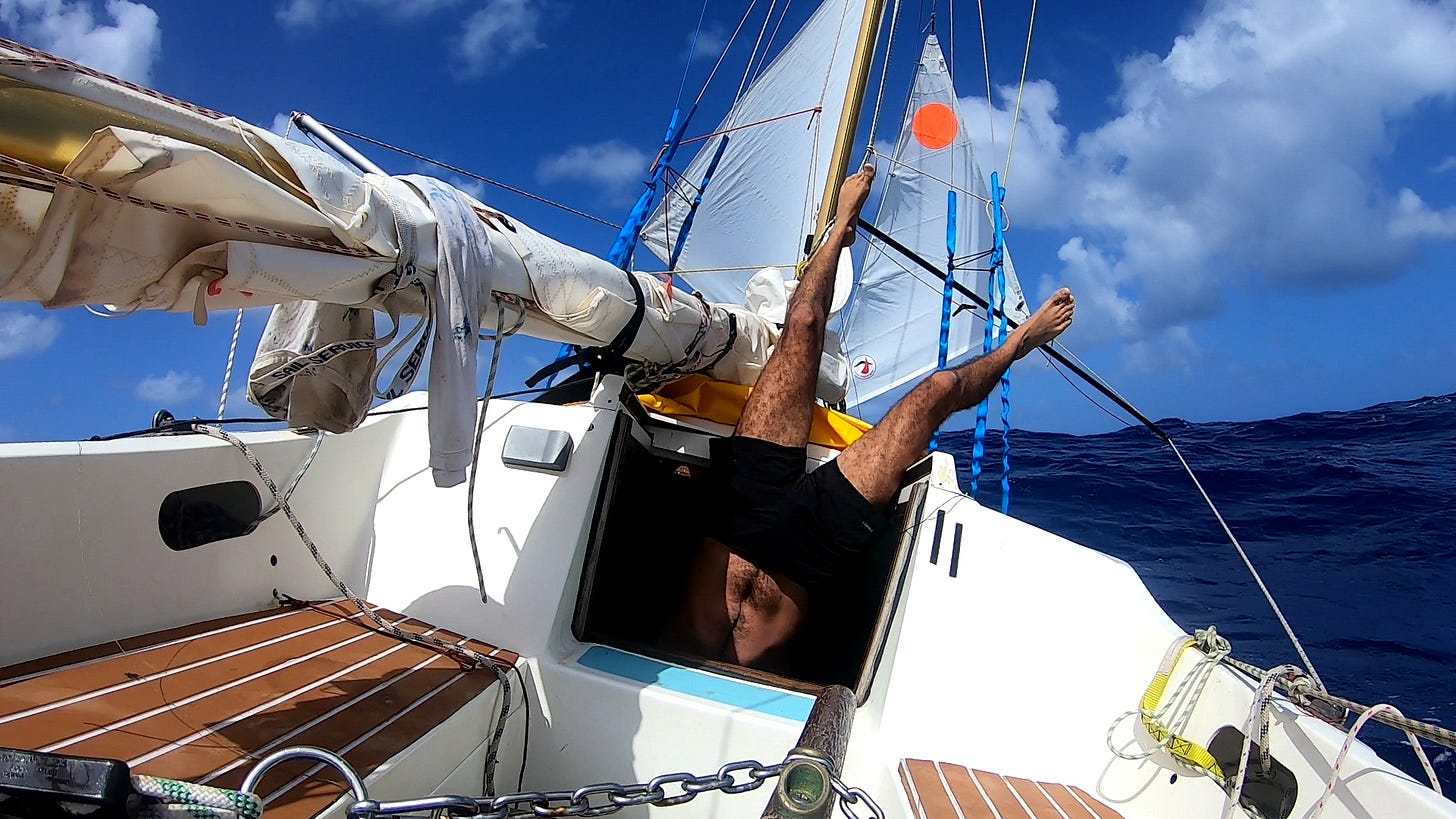
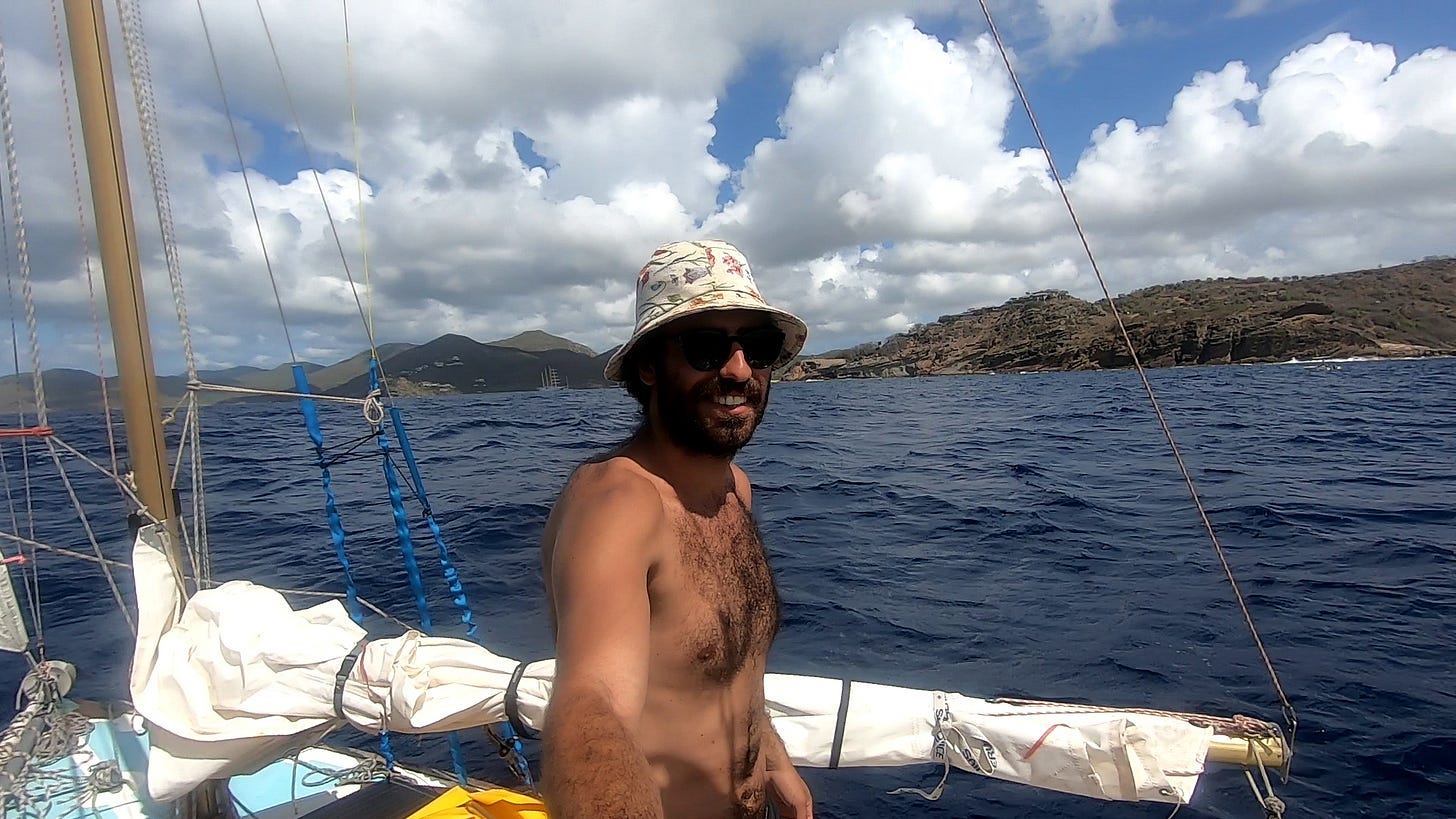
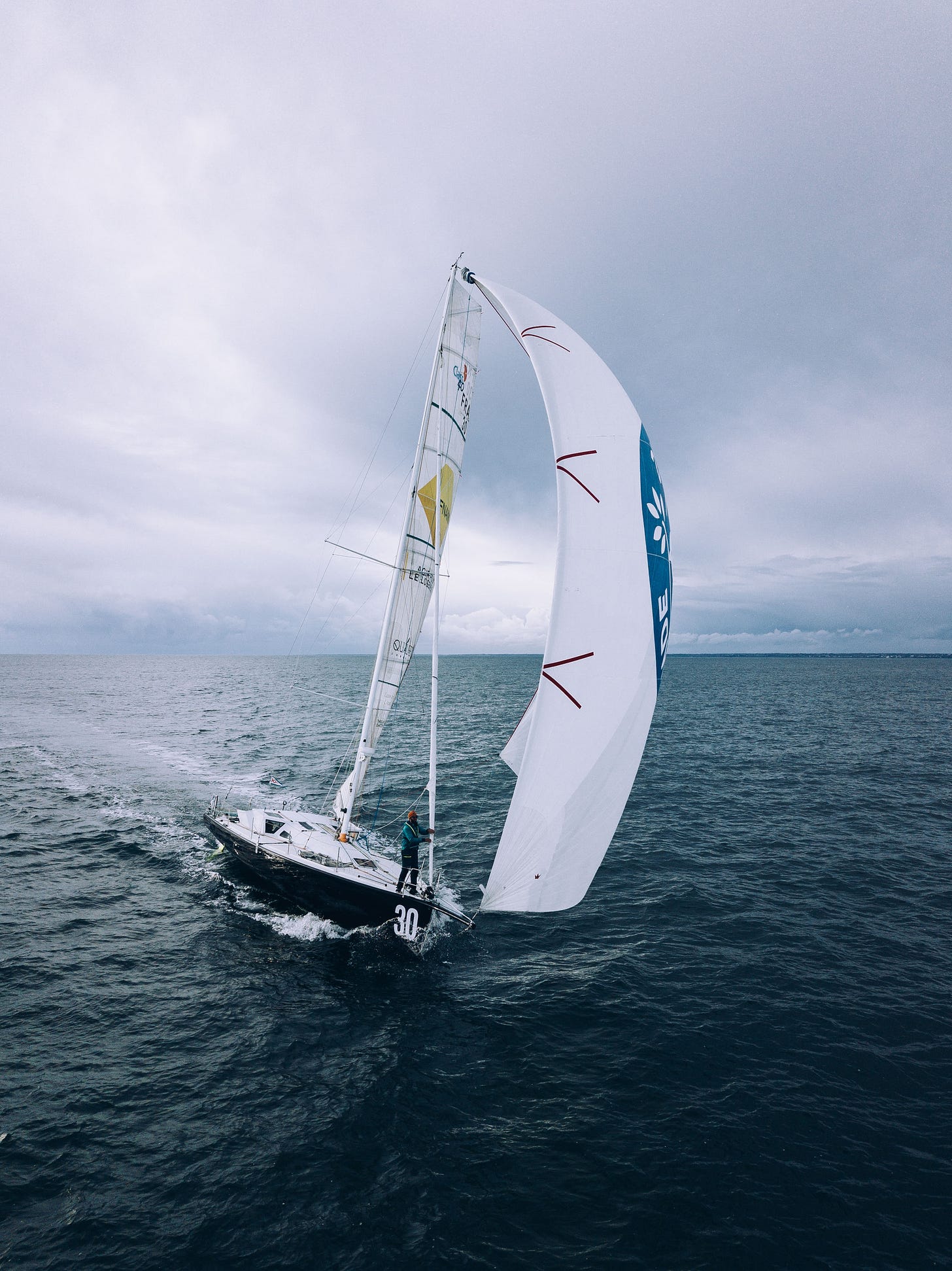
Great story! And a theme I never get tired of hearing. Dream, prepare, succeed!
I thoroughly enjoyed this, but need more information. What did he do for water? Did he have a RO water maker, or did he carry drinking/cooking water? If he carried water, how did he decide on how much to have? Considering that water weighs 8.33 lb/gallon, if he planned on 30 days at sea and then carried extra, and figuring using 1/2 gallon per day for say, 40 days, he's pushing 200 pounds in an 18' boat! If he's carrying canned goods, as recommended by the Pardees to limit the amount needed for cooking, that could be cut by 25%, but still there is the weight of the food.
Also, did he look at other rigs instead of Marconi, or was that what he was used to so he stayed with it?
I take my hat off to him for doing this, hope to see more about/from him in the future.